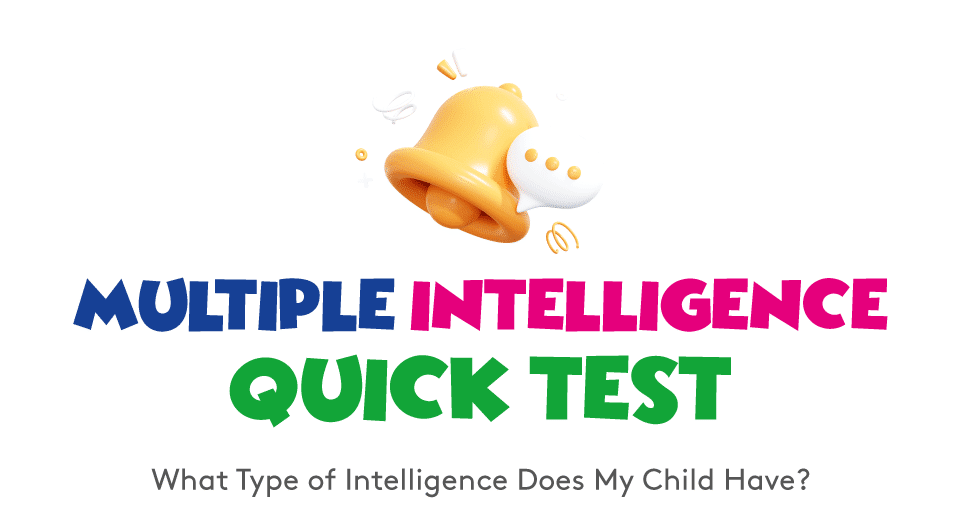

Verbal-Linguistic
Mathematical-Logical
Musical-Rhythmic
Visual-Spatial
Bodily-Kinesthetic
Interpersonal
Intrapersonal
Naturalist




Don’t worry if your child can’t score 140 in an IQ Test. Most of us can’t, too! There are 8 different types of intelligence according to Harvard psychologist Howard Gardner. Every child has different strengths which define the way they think, learn, and interact in the world.
Knowing your child’s intelligence type and how they can apply it will definitely boost their learning. Take our FREE quiz below to generate the Multiple Intelligences Map for your child. Then, have a look at what are the study tips according to each type of intelligence.
Note:
Children below the age of 10 are advised to take the test along with their parents.
Complete each section by placing a number 1, 2, or 3 next to each statement which you think applies to you:
- If you think that the statement STRONGLY describes you, score it 3.
- If you think the statement MOSTLY describes you, score it 2.
- If you think the statement SOMEWHAT describes you, score it 1.
- If you think the statement DOES NOT describe you, then score it 0.
What Your Score
MEANS
Most people who take a multiple intelligence test will have one or two very strong intelligences and one, or even two weaker intelligences, while everything else falls somewhere in the middle. It is unusual to have someone strong in every intelligence, or weak in all eight intelligences. Consequently, keep in mind that the best learning strategies and methods will vary depending on the areas in which a child has the most strengths:
Additional Details For Each Type of
Intelligence
-
Verbal-Linguistic
If your score for verbal-linguistic intelligence is high, you probably like writing, telling, or reading stories, poetry, songs, or essays. Effective study strategies using your language intelligence include reading, oral reading or acting, making notes, copying chunks of text, mnemonics, and making a note of ideas or reflections on what you have read.
-
Mathematical-Logical
A high score in this category generally indicates that you have a strong aptitude for numbers, logic, and reasoning. You tend to think like a scientist, and numbers seem easy and sensible to you. Study strategies include organizing notes in an outline, categorizing information, and using mnemonic devices.
-
Musical-Rhythmic
Musical-rhythmic intelligence applies to those who learn best through song, rhyme, rhythm and sound. Effective study techniques will incorporate these preferences into your lessons. You could try using a familiar tune to remember spelling, processes, formulae, or historical events by making up lyrics.
-
Visual-Spatial
If you scored highly in this category, you probably remember best in pictures or images. Making charts, graphic organizers, posters, slideshows, videos, or photo collages work for you as a learning strategy.
-
Bodily-Kinesthetic
Those with high bodily-kinesthetic intelligence like to move and have a lot of energy. If your score for this intelligence category is high, you probably enjoy being on the go as much as possible. Since you would rather learn by doing, the most effective study strategies are those which incorporate body movement or hands-on activities into a project.
-
Interpersonal
Those with very high interpersonal intelligence interact well with others. They tend to have good social skills and are good at both verbal and nonverbal communication. Effective techniques for enhancing your education using your social intelligence skills include taking part in group or team projects, discussions, book clubs, literature groups, or study groups.
-
Intrapersonal
Intrapersonal intelligence is demonstrated by individuals who are self-aware and comfortable spending time alone. Effective study techniques will incorporate solitary projects, writing in a journal, or analytical writing. When studying history, events or people, a powerful study technique might be role playing or examining different points of view.
-
Naturalist
If your score for naturalist intelligence is high, you probably care deeply about nature, whether your focus is rocks, trees, birds, animals, flowers or even meteorology. You love to be outdoors, are nurturing and probably like to look after animals or grow plants. Effective study techniques will encompass projects that can be tied into the environment or the natural world. This includes using photographs, drawings, or observations to augment a project.
Disclaimer: The test is provided for educational and leisure purposes only. It is important to note that these results are not clinically administered nor used for important decision-makings.
Reference:
https://kids.lovetoknow.com/wiki/Multiple_Intelligence_Test_for_Children


